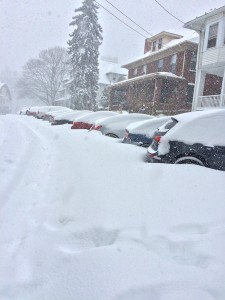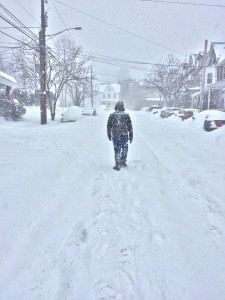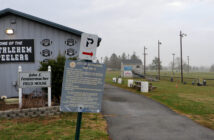
Cars are snowed in off campus on Saturday, Jan. 23, 2016. Recent snow delays have brought into question whether professors can decide to have classes during delays. (Kelly McCoy/B&W Staff)
The snowfall and ice accumulation on Feb. 15 led to Lehigh’s first class delay of the school year. The campus community received an LU-ALERT around 6 a.m. that there would be a “two hour delayed report time for all but essential staff.” Classes were to start at 10 a.m.
The morning delay meant classes officially started at 10 a.m. Professors teaching 9:20-10:35 a.m. classes, however, could cancel class completely, hold an abbreviated class starting at 10 a.m. or hold class at the normal time despite the delay.
Pasquale Costa, a professor for the Integrated degree in Business and Engineering honors program, decided to start his Introduction to Entrepreneurship class at 9:20 a.m. Costa e-mailed his students that he would be in class at 9:20 a.m. and his students were welcome to join him. He noted that students should not attend if they felt it was unsafe to travel to class.
Costa said students had the choice to attend class, and he does not grade in a punitive way. Twenty-nine of his 34 students attended the lecture.

Joel Robinson, ’17, walks on Montclair Avenue during a snow storm on Saturday, Jan. 23, 2016. Lehigh has had several snow delays recently due to severe winter storms. (Kelly McCoy/B&W Staff)
“I think that behavior says everything about the quality and commitment of Lehigh students,” Costa said.
Christa Gamboa, ’17, is a student in the Introduction to Entrepreneurship class who received Costa’s email after she had gotten ready for class. She found out about the delay after reading his email but decided to attend anyway.
“I like my professor, and I respect him a lot,” she said. “So I just went to class anyways.”
Costa said although the roads were bad, he was only starting 30 minutes before the time classes were to start that day. He encouraged students to use their judgment to weigh the risks and benefits of attending class.
He also noted that because of the variety of classes and professors at Lehigh, professors should be able to determine what the needs of their classes and students are.
While Costa made the decision to hold class at the regular time, other professors who teach 9:20 a.m. classes were unsure of the protocol for a delayed start.
Professor of economics Daisy Dai delayed the start of her Economics 146 class until 10 a.m., but said only a fourth of her students attended.
“I don’t think it’s good to keep the class open since people who might not be able to come will feel it’s unfair that they don’t get the same material as people who are able to,” Dai said.
Provost Patrick Farrell decides when classes are delayed or canceled and encouraged students to talk with one another, and to professors, to find out what they missed if classes were held and they could not attend.
When potentially hazardous weather occurs overnight, such as the storm on Feb. 15, Farrell talks to facilities workers at about 5 a.m. to get a sense of the conditions on campus and the forecast for the rest of the day. Farrell then decides if classes are delayed or cancelled.
Late starts traditionally occur because facilities cannot salt and shovel the entire campus by 8 a.m., but will be able to make significant progress by 9 or 9:30 a.m., Farrell said.
From there, Farrell’s office sends out the LU-ALERT to Lehigh students and faculty alike within 10 minutes.
“Usually it’s less about on-campus safety and more about faculty and staff who don’t live on campus,” Farrell said.
He expected the delay to mean that 9:20 a.m. classes would start at 10 a.m. but this expectation was never explicitly stated to staff.
“Whether we want to do that at the institution level or the class level should be clear to students,” Farrell said.
Farrell said he hoped faculty would be understanding and not critical of students who couldn’t make class because of the weather. He urged faculty to clarify their snow delay policy with students at the beginning of the semester so neither party is confused if there is a delay.





Comment policy
Comments posted to The Brown and White website are reviewed by a moderator before being approved. Incendiary speech or harassing language, including comments targeted at individuals, may be deemed unacceptable and not published. Spam and other soliciting will also be declined.
The Brown and White also reserves the right to not publish entirely anonymous comments.